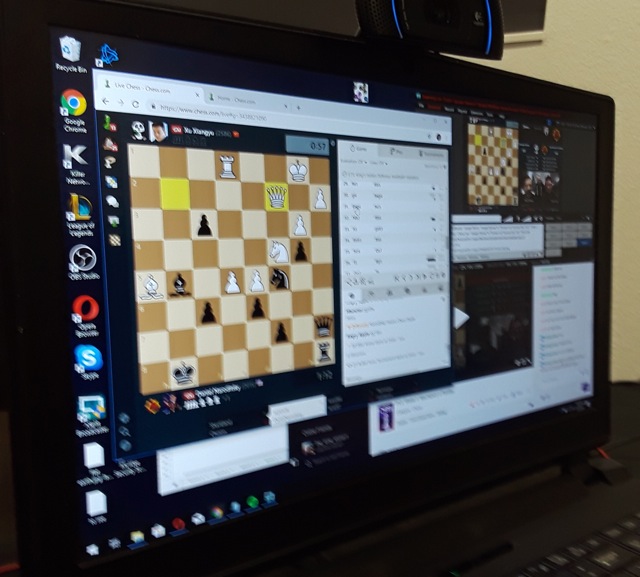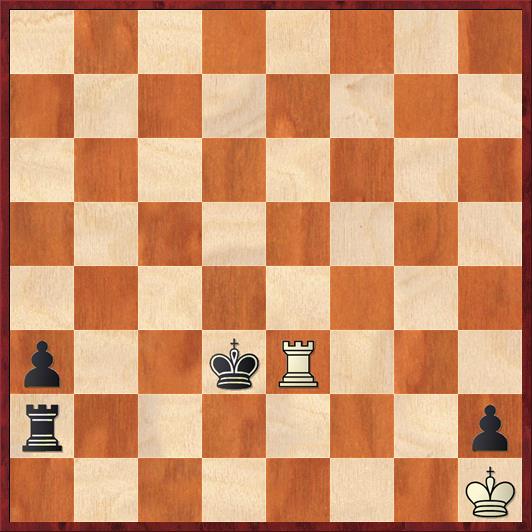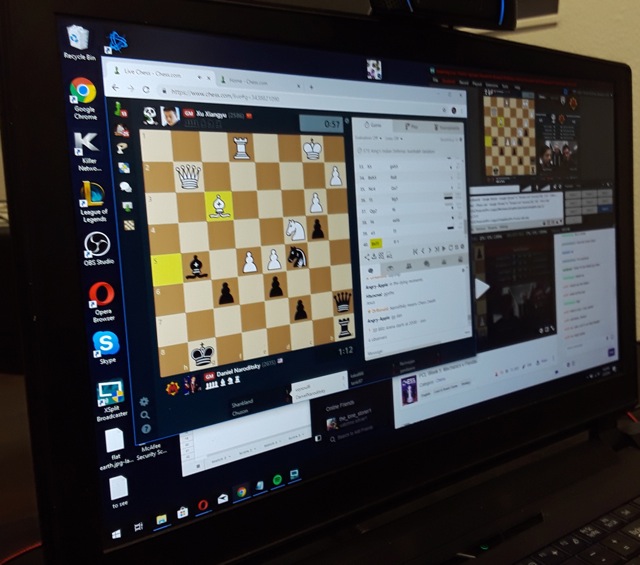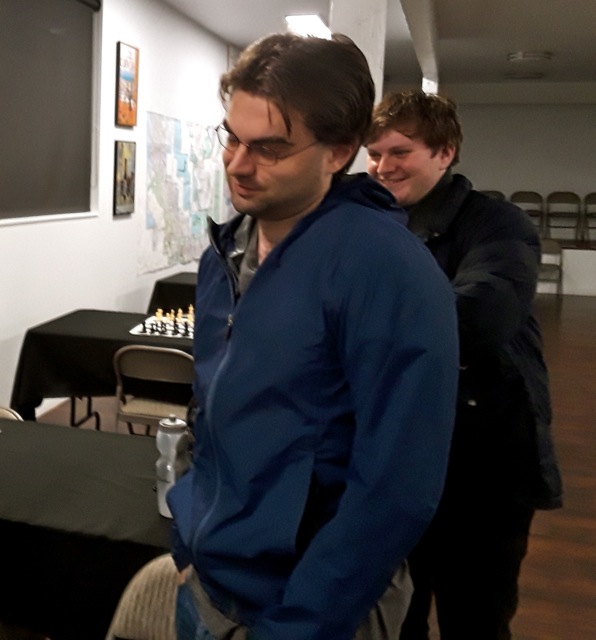
First, let’s get one thing straight. Avalanches never happen in Berkeley. Reason one: There’s no snow.
But yesterday, for the first time since 2011, there was snow in the mountains to the east of San Francisco (the Diablo Range, for those of you who are really up on your geography). As I drove from Santa Cruz to the San Francisco Mechanics’ PRO Chess League match in Berkeley, I couldn’t miss the white-capped mountains in the distance. It felt as if I had been transported from the East Bay to someplace in the Rockies.
Of course, down at street level there was no snow, but it was an appropriate day for a chess avalanche, as the Mechanics trounced the Chengdu Pandas, 9½- 6½. The match wasn’t even as close as the score indicates. Going into the fourth “quarter,” we had an 8-4 lead. Needing only a draw in one of our four games to secure the match, we got it quickly from Daniel Naroditsky and coasted the rest of the way.
The match was reminiscent of an avalanche in other ways. When we got small advantages, they grew into big ones. When we needed a stroke of luck, we got it. It was the complete opposite of the first four weeks of the season.
This position from the first round, with our second board (Parimarjan Negi) playing Black against the Chinese third board (Chu Wei Chao), was the pebble that got the avalanche started.

Position after 1. Re3+. Black to move.
Up until this point, the game had been a lot like the first four weeks of the Mechanics’ season. Negi got a nice position but couldn’t capitalize on it, and it looks as if he will have to settle for a draw. All that Chao has to do is follow Black’s king around with his desperado rook, which Negi can never take because it would be stalemate. Except in one possible variation:
1. … Kd2
Why not try everything before you accept a draw? Especially when your opponent has less than ten seconds left.
2. Re2+??? …
I just can’t imagine what Chao was thinking. All he has to do is make a left turn and play 2. Rd3+. The most picturesque line would be 2. … Kc2 3. Rc3+ Kb2 4. Rb3+ Ka1 5. Rb1+, when Black has only one legal move (5. … Kxb1) after which White has no legal moves (stalemate!).
2. … Kxe2
And only now, Chao saw that there is no stalemate because he can play 3. Kxh2. He resigned immediately.
This stroke of luck turned a probable 2-2 tie into a 2½-1½ lead for us. And things just got better from there. In the second round, Daniel Naroditsky won the game of the night in a fantastic battle with the Chinese number one board, Xu Xiangyu. The key moment (actually, one of several key moments) from that game is in the photograph at the beginning of this post. Naroditsky has just played the amazing move 1. … f3!!, putting the f-pawn in a position where White could take it with either the queen or the bishop. Xu didn’t do that, for reasons we’ll get to in a second, but he has played 2. Qc2 instead. Do you see Danya’s reply?
Watching the game on the monitor, Ladia Jirasek and I both came up with 2. … f5? with the idea of trying to lure White’s queen away from the defense of a2. But Naroditsky found an even more sensational move: 2. … Ne4! For the second straight move, he has put a piece on a square where it can be taken in two different ways! Of course 3. Qxe4 loses to 3. … Qxa2+. I’m not as clear on what happens after 3. Rxe4. Probably Naroditsky intended 3. … Qg1+! 4. Kb2 f2, when White can’t stop the suddenly powerful f-pawn from promoting. But he can give up a piece for it with 5. Be2 f1Q 6. Bxf1 Qxf1, and I’m not sure what to make of this position. Something spooked Xu, though, and he allowed the knight to stay on the board. But from there Danya had a great advantage, with his knight drawing a bead on c3 and his f-pawn threatening to advance. I’m sure that this game will be considered for a Game of the Week prize, especially if it turns out that Black is indeed winning after 3. Rxe4 in the above line. In any event, those of us watching in the Berkeley Chess School (Ladia, me, Ezra Chambers, and David Pruess and Andy Lee, who were broadcasting the match on twitch.tv) were quite impressed.

By the way, there was also an interesting moment one move before the position in the first photograph. At first, we were mystified by the question: Why couldn’t Xu take the pawn on f3 with the bishop: 2. Bxf3? (See photo below.)

The answer is truly diabolical: Danya would have played 2. … Nxb3! Now it seems as if White’s attack is overwhelming after 3. ef, but Black’s steed gallops to the rescue at the last second: 3. … Nd2+! 4. Kc1 Nxf3+! That’s why Danya wanted to lure the bishop to f3! Or if 4. Nxd2 Qxa2+ 5. Kc1 Qa1+ (or Qc4+) is annihilating.
You can’t call this luck because Daniel planned the whole thing, but it does seem a little bit like magic that all the pieces were just on the right squares for him to pull off this amazing simultaneous attack and defense.
That game was the key to a crushing 3-1 round that put the Mechanics in the driver’s seat with a 5½-2½ lead. It was tied for our best quarter of the season. We also outscored San Jose 3-1 in the fourth quarter of week one, but that one is a bittersweet memory because it merely gave us a “close, but no cigar” comeback in a match that we lost, 8½-7½.
This time there would be no comebacks for Chengdu. In fact, manager David Pruess pointed out that we had a somewhat comeback-proof lineup with three grandmasters in it. This was a weird match in some ways because our top three players all had ratings above Chengdu’s top three. For whatever reason (other commitments, I would imagine) China’s five top-rated players could not play this match, so their top board last night was actually the #6 player on their team, Xu Xiangyu. David has a huge amount of respect for Xu, who played well for Chengdu last season, but Xu definitely was not on his game last night.
Round three was more of the same: a beautifully played victory for Daniel Naroditsky, a somewhat lucky victory for Parimarjan Negi, and a 2½-1½ margin overall. As mentioned before, that gave us an 8-4 lead going into the last quarter.
The fourth quarter was the only disappointment of the night. Sam Shankland, playing against Xu on board one, played a Benko Gambit and seemed to have a very promising position, but he made just one little inaccuracy. He should have created luft for his king at some point, and with characteristic Shankland confidence he said that he would have been winning. In the absence of that preparatory move, he was forced to attack a little bit less aggressively because he had to watch out for back rank mates, and Xu was able to hang on and draw.

The other slight disappointment in round four was Rochelle Wu’s loss on fourth board. I haven’t mentioned her yet, but the tradeoff involved in having a lineup with three grandmasters is that you have to put a lower-rated player on board four, in order to make the average rating under 2500. This can be tough for the board-four player, who has to endure beatings from much higher-rated players. But we were all proud of how Rochelle did. She gave Xu a very tough battle in round one. In round four her opponent, Woman Grandmaster Zhai Mo, sacrificed a pawn for a scary attack, but Rochelle very nearly escaped. Again, Sam was there to sum things up in a pithy phrase: “I don’t see why White [Rochelle] isn’t better.” But finally, in an insanely complicated position and ten seconds left on her clock, she walked into a mating net.
So in the end, Rochelle went 0-4, but I think that she has the right psychology to not get discouraged and to take this as a learning experience. Fortunately, we didn’t need a point from her to win this match. I am sure that she will play in future matches, because I think she is the only player rated low enough to let us play three grandmasters. I’m sure that before the season is over, she will score a point for us, and it may well be the decisive point in a match.

The one thing I think Rochelle needs to work on (a disease with which I am very familiar) is time trouble. In round one, for example, she got to a situation where she had one minute to Xu’s ten, and that is not sustainable against a grandmaster.
So, does this big victory rescue the Mechanics’ season? Let’s start with the good news: We have finally gotten out of last place! But we still have a lot of work left to reach our main goals. First, we need to get to sixth place or better to ensure that the Mechanics remain in the league next year. We perhaps caught a little break last night, as the fifth- and sixth-place teams tied 8-8, which allowed us to make up some ground on both of them. Still, we are a long way behind. Here are the standings in the Pacific Division:
1. Chengdu – 99.5 points
2. Dallas – 97
3. Minnesota – 92
4. Australia – 87
5. San Jose – 85.5
6. Seattle – 84
7. San Francisco – 61.5
8. San Diego – 45
With half the season still left, including two of the three Battle Royales, there is no question that we can still move up to #6. If so, then we can set our sights on the real objective, which is making the playoffs. At the moment there is not a big gap between #6 and #4, so realistically we still have a chance. Especially if Daniel Naroditsky can continue playing like a beast, as he has for the last two weeks!
For people who want to look ahead, next week’s match will be against San Diego, which suffered an unbelievably crushing 14-2 loss to Dallas last night. Obviously that will be a match we are favored to win and really have to win to achieve our team goals. But there are no easy matches in the PRO Chess League!


